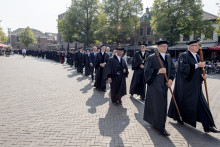In terms of PhD graduates of the University of Twente, Jeff St. John is a bit of a unicorn. Already the topic of his PhD work is unique: understanding what it means to be a father in today’s society. Not to mention that his method and his goal are also unconventional: using autoethnography, a method based on personal experiences, to create a thesis that is meant to open a dialogue, rather than to give definitive answers.
‘There is not equality in family settings’
Jeff St. John’s resume is quite a rare sight at a technical university. After studying sociology, theology and psychology, he worked in social services. Among other things, he was providing help to vulnerable families, working as a therapist for young men and boys and organizing outdoor wilderness experiences for youth at risk in his home country of Canada. He wrote his Master’s thesis on the topic of Leadership and Social Innovation and wanted to continue doctoral work in this field, but then his plans changed.
The reason was the birth of his daughter, who he’s had in 50/50 joint-shared custody. As Jeff St. John describes, he has always wanted to be close with his daughter and play an important part in raising her, but it seemed that others weren’t quite ready for that: ‘I experienced that the community would rather see me in the role of a provider and my ex-wife as the primary caregiver. I found that there was not gender equality in family settings and wanted to understand that. Research on fathering has so far not said much about our personal experiences, about how we create the role of a father as a society.’

Experimental research method
St. John chose an unusual research method: ‘Autoethnography is on the experimental end of qualitative research. It is often described as action research on an individual level. It requires the researcher to not create a sense of objectivity, but to leave his or hers experience open for discussion in the academic work,’ he explains.
Although different, autoethnography takes a similar approach as ethnography. ‘To create my thesis, I used field notes in the form of diary entries, observations of cultural experiences and rituals and artefacts such as photos, songs or even poetry,’ describes St. John. ‘The work is meant to shine light on the micro level of how we shape culture and how it shapes us. The method is just a lot more personal than we are used to. The entire research is based on my personal experiences, even though other voices are involved, such as my talks with fathers in similar situations.’
‘The thesis is meant to be disruptive’
Unlike PhD projects we might be used to, St. John’s work doesn’t reduce anything to general themes. ‘We want concrete and objective answers, but human lives aren’t like that. Cultural experiences are very complicated. The main goal of my PhD research was therefore to open a dialogue rather than to find definitive answers. I offer my critical reflection, but the reader can and even should have their own, which might be completely different from mine,’ says St. John.
‘Good social science research should not only illuminate our social experiences, but also compel a change. I wanted to open space for new research – my work should be impactful, although it is not generalizable. The thesis is meant to be disruptive in the field of methodology and start a discussion on what research is and how we think about it. It was also a transformative experience, which taught me how I can be a better father.’
At the UT for the first time for his PhD defense
As mentioned, Jeff St. John isn’t a typical UT graduate. So how did this Canadian end up at the UT? ‘I have cooperated with the TAOS institute, a non-profit organization based on social constructionism, that offers educational opportunities – such as a PhD program - and cooperates with many universities, including the University of Twente. They connected me with Prof. Celeste Wilderom, who was my official advisor,’ answers St. John, who actually visited the UT for the first time last week, when he successfully defended his PhD thesis titled ‘Pacing the Cage: An Autoethnographic ‘Showing and Telling’ of Fathering in Fierce Landscapes’.
 Jeff St. John - Photo by Kim Bellavance
Jeff St. John - Photo by Kim Bellavance







